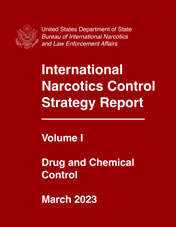
U.S. Strengthens Counternarcotics Efforts in Georgia Amid Growing Drug Trafficking Challenges
By Liza Mchedlidze
Friday, February 7, 2025
The United States Department of State's Bureau for International Narcotics and Law Enforcement Affairs has released its International Narcotics Control Strategy Report for 2023, which highlights the increasing role of Georgia as a transit hub for opiates and synthetic drugs. These drugs are trafficked from Afghanistan, Iran, and other Eurasian countries, using shipping routes to Europe via the Black Sea.
According to the report, since the onset of Russia's 2022 full-scale invasion of Ukraine, transnational drug organizations have expanded their operations, using new routes across Georgia to transport opioids and synthetic drugs from Europe to countries such as Turkey, Armenia, and Azerbaijan. In response to these growing challenges, the United States has continued to strengthen Georgia's counternarcotics capabilities.
In 2023, U.S. assistance included training Georgian law enforcement in key areas such as detecting and preventing drug smuggling, passenger screening, and identifying money laundering activities. Additionally, U.S. support included enhancing information sharing and fostering international cooperation to disrupt transnational criminal organizations involved in drug trafficking.
The report also details successful joint operations between the U.S. and Georgian authorities. For instance, in April 2023, a collaboration between the Georgian Central Criminal Police Department (CCPD) and Belgian authorities, facilitated by the U.S., led to the seizure of 400 kilograms of heroin. A subsequent operation in May 2023, also supported by the U.S., resulted in the identification of a commercial container from Iran, seized at the Poti Port, with 80 kilograms of heroin.
On the legislative front, the report highlights the adoption of a new Drug Strategy for 2023-30 in Georgia, which includes four key pillars: drug prevention, treatment and rehabilitation, harm reduction, and supply reduction. Additionally, the country has implemented an Action Plan for 2023-24, introducing initiatives such as an Early Warning System to monitor emerging drug trends and a Drug Related Death indicator.
Georgia's commitment to international cooperation is also evident, as the country joined the U.S.-led Global Coalition to Address Synthetic Drug Threats in 2023. This coalition is focused on combating the global rise in synthetic drug use, and Georgia is actively participating in several working groups.
Despite these efforts, challenges remain. Drug-related legislation in Georgia continues to rely heavily on punitive measures and efforts to restrict the flow of drugs. Furthermore, geographical access to Opioid Substitution Therapy remains a significant barrier, with a long-term medical program for opioid substitution within the penal system still underdeveloped.
As the report outlines, addressing the evolving drug trafficking threat requires continued international collaboration, stronger infrastructure, and ongoing support to enhance Georgia's counternarcotics efforts.

